When it comes to email marketing platforms, Shopify and Mailchimp are two of the most popular choices for small business owners.
With their array of features and capabilities, these tools can help companies effectively connect with customers, promote products and services, and grow their business.
However, choosing the right platform to fully capitalize on the benefits of email marketing isn’t always easy. In this Shopify Email Marketing vs Mailchimp comparison article, we will closely examine the two platforms across a number of factors to give you a clear understanding and help you make an informed decision regarding the best email marketing solution for your unique needs and goals.
1. Understanding the Basics
Shopify was founded in 2006 by Tobias Lütke, Daniel Weinand, and Scott Lake. The company is headquartered in Ottawa, Canada, and is a publicly-traded company with a market cap of $185 billion as of January 2023.
Shopify is used by over 1.7+ million businesses in 175 countries and is very popular among small to medium businesses looking to build a web store. Shopify also has an active Facebook community of over 1 million members in the group Start Your Ecommerce Empire.
Mailchimp was founded in 2001 by Ben Chestnut and Dan Kurzius. The company is headquartered in Atlanta, Georgia, and is a privately owned company with an estimated valuation of $4-10 billion. Mailchimp is used by more than 14+ million users worldwide and is popular for its email marketing, automation, and CRM features. The official Mailchimp Facebook group has over 13,000 members.
2. Features and Functionality
Automation
Shopify

Shopify is a powerful tool that offers a variety of automation features to help streamline workflows for marketing and sales. The platform includes Shopify Flow, which allows you to create custom automation using triggers and actions for your Shopify store.
For example, you can set up welcome emails for new customers, sales emails, or abandoned cart reminders. Shopify email also has preset automation for common tasks like sending follow-up emails and emails to build relationships with your audience. These automations are easy to set up with drag-and-drop functionality.
Another automation feature is Shopify Scripts, which are custom apps that can automate repetitive tasks on your website or email platform. Scripts can be created with JavaScript and Liquid coding. While scripts offer advanced options, they require more technical skills.
Overall, Shopify’s visual editor and preset automation make it simple for novices to get started with basic automation. Developers will appreciate the additional flexibility from scripts.
Mailchimp
Mailchimp provides powerful automation through its workflow feature. Workflows allow you to create sequences of timed actions, like sending a series of automated emails. You can set up workflows using drag-and-drop blocks or by using the workflow builder tool. Pre-built workflows are also available to automate common tasks like welcoming new subscribers, social media management, running social contests, event follow-ups, and more.
Advanced users can edit workflow blocks and write custom JavaScript code. Mailchimp also offers landing pages and forms that can integrate with workflows to collect data and trigger sequences. With flexible timing options, conditional logic, and segments, Mailchimp workflows are highly customizable for both simple and sophisticated automation needs. The visual workflow builder makes it accessible for beginners.
Winner: Mailchimp
Both Shopify and Mailchimp offer user-friendly visual email automation builders to help novices get started with simple automation. However, Mailchimp takes the lead when it comes to flexibility and advanced options for sophisticated workflows. Its robust conditional logic, segments, and ability to integrate forms and landing pages give Mailchimp the edge. The combination of ease of use and customization makes Mailchimp our winner for automation capabilities.
Email Templates
Shopify

Shopify offers customizable website and email templates and a DIY template editor to customize the design, layout, and content of email templates.
There are over 30 free, pre-designed templates spanning categories like abandoned carts, shipping updates, follow-ups, and more to suit different types of email subscribers. Customizing the templates is easy with Shopify’s drag-and-drop editor. You can add/remove sections, change colors and fonts, insert images and buttons, and edit text. Advanced custom CSS code can also be added for greater design flexibility.
While the Shopify email app has beautiful templates, the selection is still quite limited compared to other platforms. Setting up a professional, customized template requires starting from scratch which takes more time and design skills. Shopify’s templates are ideal for basic customization needs but lack advanced options.
Mailchimp
Mailchimp provides hundreds of professionally designed email templates ranging from welcome emails to holiday promotions and more. Each template is mobile-optimized and easily customizable. With the drag-and-drop editor, you can quickly swap template sections, modify text, adjust colors and padding, and add images. Advanced users can edit HTML and CSS code.
Mailchimp also offers free stock photos and allows you to save customized templates to easily reuse them. For further customization, users can build emails using a blank template. With so many polished templates that can be quickly personalized, Mailchimp makes it simple to create professional, on-brand emails.
Winner: Mailchimp
This Shopify Email Marketing vs Mailchimp comparison shows that while both platforms offer drag-and-drop customization of templates, Mailchimp wins for its wider selection of professionally designed email templates. The large variety covers all common email needs from promotions to shipping notifications. Templates can be quickly personalized with the intuitive editor. For small businesses without in-house designers, Mailchimp provides an easy way to make emails look polished.
Segmentation
Shopify

Shopify email allows you to segment contacts based on a few preset categories like customer tags, purchase history, and email activity. You can then target emails and promotions to specific segments. However, segmentation is fairly limited compared to other platforms. There is no visual segment builder and the preset segments are basic.
More advanced segmentation would require exporting your list and segmenting in another tool like Klaviyo. The Shopify email marketing app also doesn’t allow combining multiple conditions to create highly targeted segments. Overall, segmentation is possible but requires workarounds and lacks more granular options.
Mailchimp
Mailchimp has powerful segmentation tools through its audience feature. You can combine multiple types of conditions like demographics, purchase history, email activity, interests, and more to create highly targeted segments. Mailchimp also provides a visual audience builder tool to easily create and manage segments.
In addition, Mailchimp has smart segments that automatically update email campaigns based on specified criteria. You can segment randomly for A/B testing as well. Overall, Mailchimp provides very flexible segmentation options to target customers in a personalized way.
Winner: Mailchimp
The Mailchimp vs Shopify comparison shows that while the Shopify email app has basic segmentation capabilities for commerce businesses, Mailchimp has all the tools for advanced audience segmentation.
Mailchimp allows both simple and complex combinations of conditions to precisely target groups. The visual builder simplifies the process for beginners. Smart segments also save time. Mailchimp’s robust audiences and segmentation make it our winner.
Analytics
Shopify

Shopify provides basic email analytics showing opens, clicks, unsubscribes, and spam reports. You can view results for individual campaigns or get aggregated reports on your overall email program. More advanced features like link tracking and location data are available. Shopify also integrates with Google Analytics for expanded reports.
However, customizing analytic views takes some work in the Shopify email marketing tool. The tool lacks campaign grouping or advanced segmentation of metrics. There are also no e-commerce A/B testing capabilities or predictive analytics. While Shopify covers the fundamentals, it trails other platforms when it comes to customizable, actionable email insights.
Mailchimp
Mailchimp comes with powerful analytics features for understanding your audience and optimizing email performance. Reports include opens, clicks, conversions, unsubscribes, and more. You can group messages into campaigns for comparative reporting. Mailchimp also tracks audience demographics like location, device, activity time, and more.
Custom dashboards, A/B testing, and template performance comparisons allow granular analysis. Predictive analytics offer suggestions to improve deliverability, open rates, and click-through rate metrics.
Overall, Mailchimp provides expansive analytics options for gaining actionable insights for increased revenue. Users can also integrate Google Analytics for more data.
Winner: Mailchimp
While Shopify email provides basic email analytics, Mailchimp has a much more robust analytics suite. Mailchimp’s campaign grouping, visual reports, customizable dashboards, A/B testing, and predictive features give it the winning edge. Mailchimp provides the tools for both high-level and granular analysis of email performance.
Unique Features
Shopify
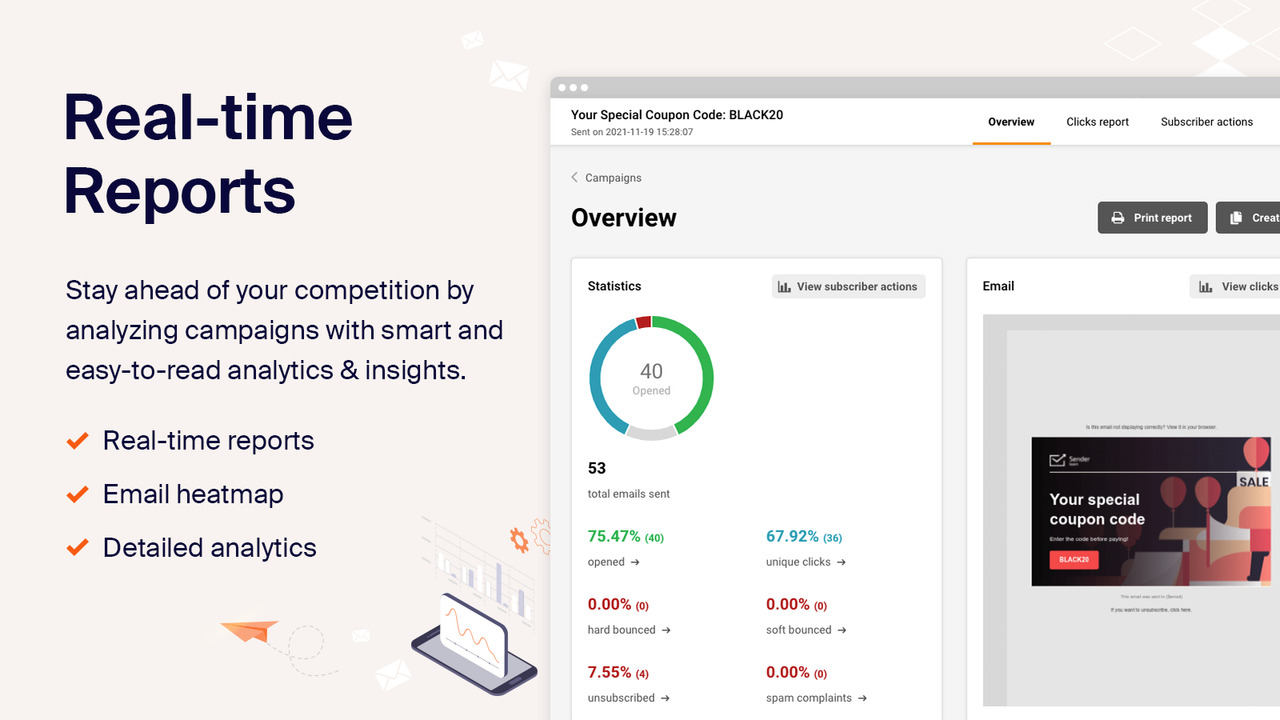
One standout feature provided by Shopify is its tight integration with online stores powered by Shopify. When you use Shopify for both your store and emails, they automatically sync product/order data. This allows for seamless tracking of purchase-based metrics and targeted automation based on store activity.
The Shopify email marketing software also offers click maps and SMS marketing in addition to emails for multi-channel email campaigns. SMS tools are built into the platform for unified messaging. While useful for Shopify merchants, those benefits are limited if you aren’t using Shopify to run your online store.
Mailchimp
A key unique feature of Mailchimp is its automation and CRM capabilities beyond just email. Mailchimp has landing pages, forms, surveys, and social ad management. Its workflows can trigger actions across these tools to create sophisticated marketing funnels and campaigns.
Mailchimp also provides more order management and inventory features compared to Shopify. You can send emails and track product and order data from any store provider to power targeted emails. Overall, Mailchimp’s expanded feature set beyond just email gives it an edge.
Winner: Mailchimp
Mailchimp wins the Shopify Email vs Mailchimp comparison. The unified experience and SMS functionality are useful if you specifically use Shopify for e-commerce. However, Mailchimp’s strengths in multi-channel automation and non-email features make it more versatile for integrated e-commerce marketing campaigns, regardless of your store platform. Its broader tools for managing customer data also power more robust email targeting.
3. Ease of Use
Shopify
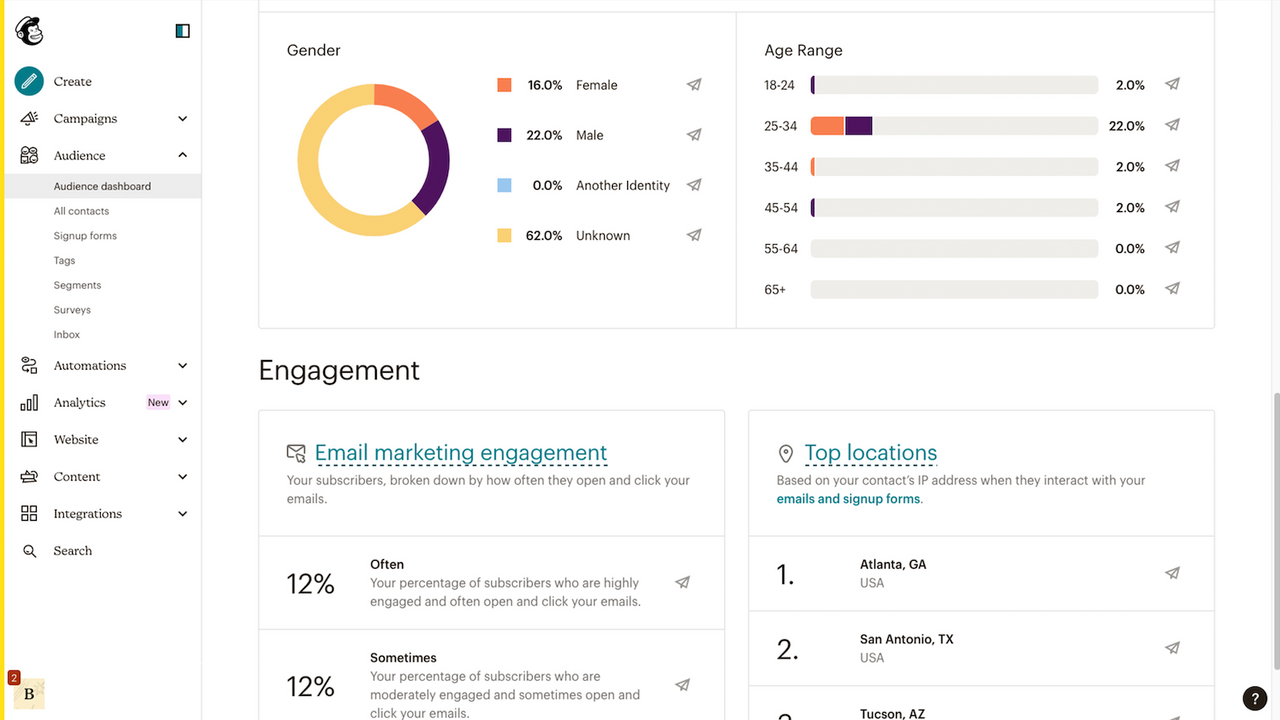
Shopify provides has a user-friendly interface and an intuitive dashboard with easy drag-and-drop functionality. The layout is clean with key information clearly presented. Common tasks like creating campaigns or viewing reports are accessible from the main menu.
The Shopify email marketing platform is beginner-friendly with preset templates and automations available. New users can quickly launch campaigns aimed at their target audience. Shopify also has detailed help docs and an active Facebook community for support to cater to all business needs.
However, more advanced features like scripts or custom CSS do have a steeper learning curve. Shopify is easy to start with but to access certain capabilities requires more expertise. The interface can sometimes feel a bit cluttered too.
Mailchimp
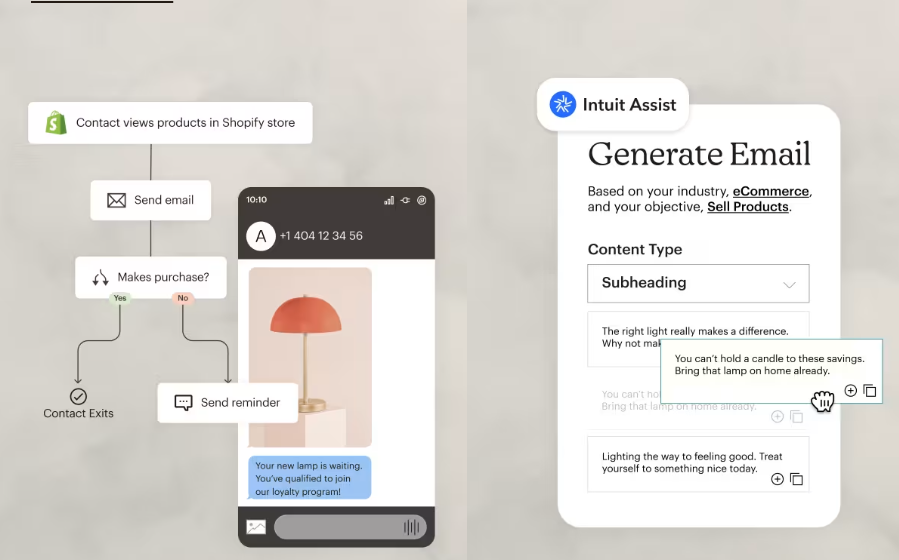
Mailchimp offers a clean, uncluttered interface that is welcoming to beginners. Key features and reports are found in a simple main menu. Drag-and-drop builders for emails, landing pages, and automation simplify complex tasks.
Helpful prompts guide users through each step and provide suggestions. Mailchimp’s mascot, Freddie, offers tips too. Detailed wizards make initial account setup and list importing easy. The platform is very intuitive overall.
More technical features do require learning. But Mailchimp’s core functions are easier to use for novices than Shopify. The UI design choices aid user-friendliness.
Winner: Mailchimp
Both platforms offer drag-and-drop functionality and have elements aimed at beginners. However, Mailchimp’s interface decisions, clear menus, simplified builders, and helpful prompts provide superior ease of use, especially for email marketing newbies. It onboards users smoothly and maintains simplicity as you scale features.
4. Email Deliverability
Shopify

Shopify monitors email deliverability and spam testing. It offers DMARC and SPF setups to improve deliverability. Shopify also automatically removes inactive subscribers from lists.
However, there are no advanced deliverability features like IP warming or sending reputation monitoring. eCommerce users are dependent on Shopify’s infrastructure. There are also no predictive tools to analyze how campaigns may impact future deliverability.
Overall, Shopify email covers the basics but lacks robust deliverability capabilities compared to dedicated ESPs. Merchants may need to augment with external monitoring and optimization tools.
Mailchimp
Mailchimp comes equipped with sophisticated deliverability features. It offers detailed deliverability reports, threat monitoring, automated spam testing, and IP warming.
Users can research IPs’ sending history and reputations before use. Predictive tools analyze potential issues with campaigns. Send time optimization and other suggestions to help maximize deliverability.
Granular tracking of bounce types, spam complaints, and more assist with list hygiene. Overall, Mailchimp provides expansive tools to master professional deliverability.
Winner: Mailchimp
Shopify does not focus on in-depth deliverability capabilities while Mailchimp excels in this area. Mailchimp’s predictive and preventative tools help avoid common pitfalls through intelligent monitoring and recommendations. Its analytics provide optimization insights. For those prioritizing email deliverability, Mailchimp is the clear winner.
5. Customer Support and Community
Shopify
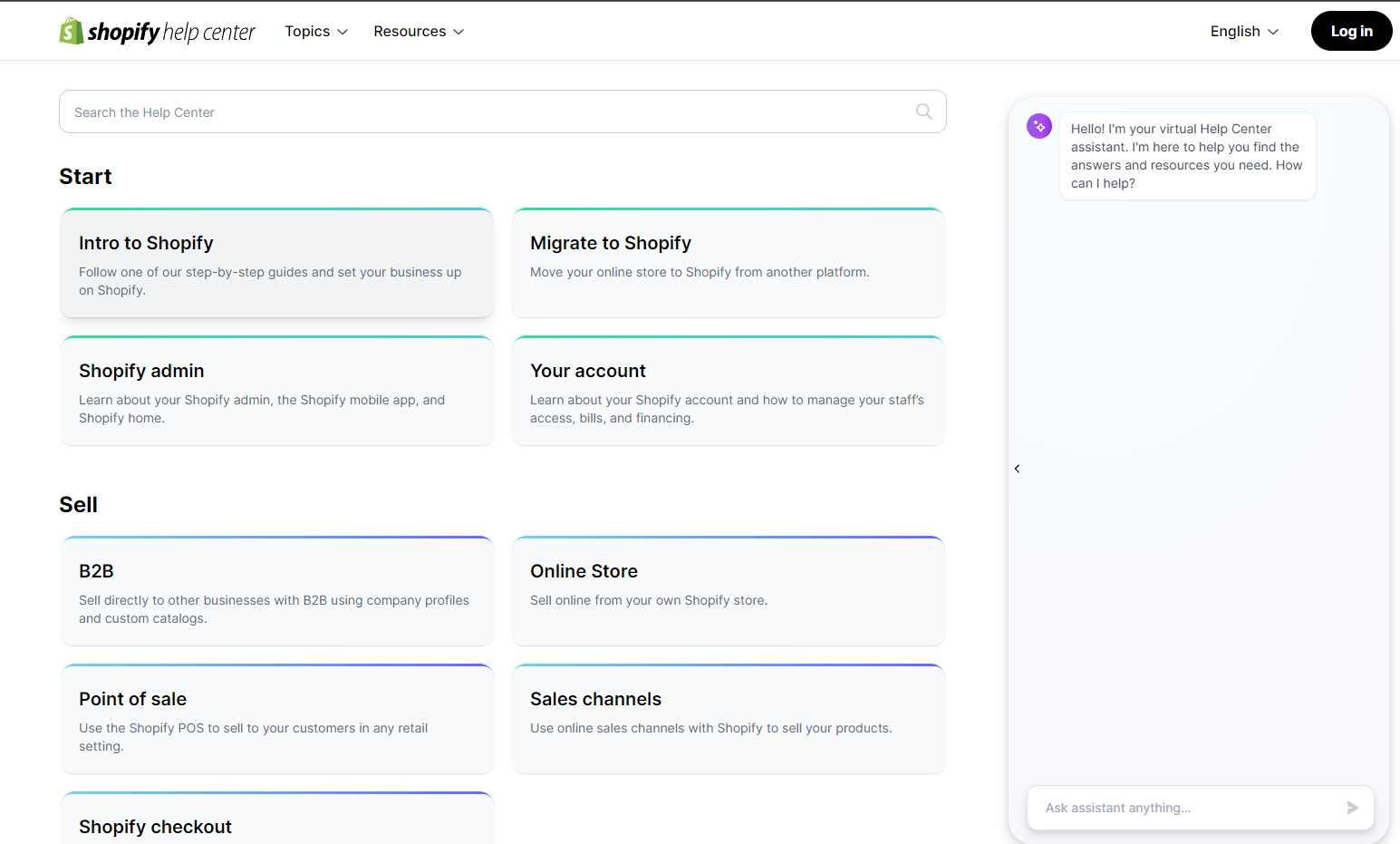
Shopify email provides 24/7 support via live chat, email, and phone. Support reps are knowledgeable in helping troubleshoot issues. The Shopify Help Center also offers extensive articles, guides, and FAQs.
For community support, Shopify merchants can join the Shopify Discussion Forums to connect with other users. There is also a popular Facebook group for Shopify e-commerce merchants with over 1 million members.
However, support response times can sometimes be slow. The community options are more suited for Shopify merchants specifically. Those using Shopify primarily for email may find less specialized support.
Mailchimp
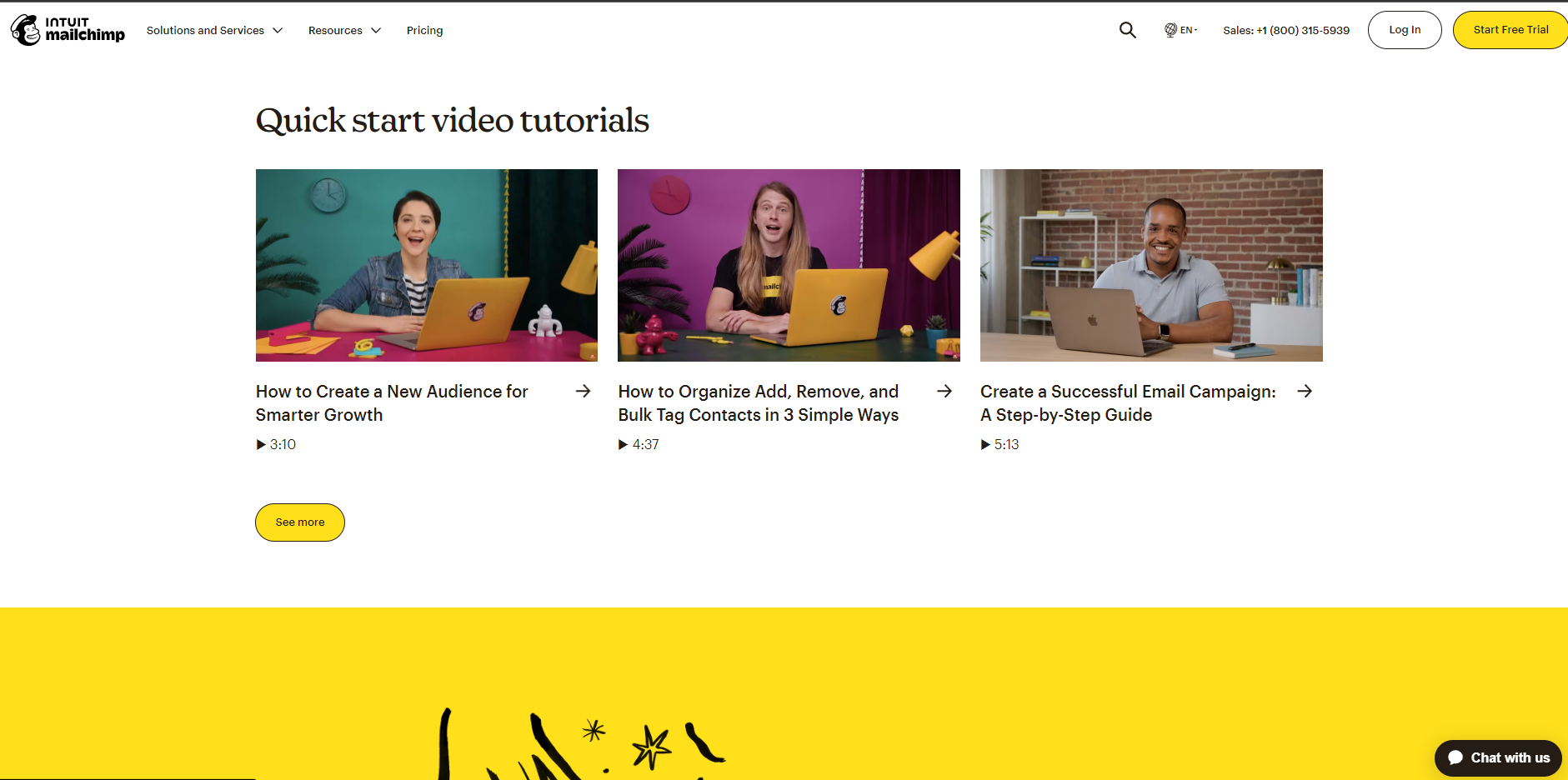
Mailchimp offers 24/7 email and chat support, along with an extensive knowledge base of how-to articles and troubleshooting guides. Typical support response times are under 30 minutes.
The official Mailchimp Facebook page is active with over 300k likes. Users can also find tailored advice and discussions in a large Email Marketing Community Facebook group.
Between timely official support and an engaged user community focused on email marketing, most Mailchimp users can find help when needed.
Winner: Mailchimp
Both platforms provide around-the-clock customer support. However, Mailchimp’s faster response times and more active user community tailored to email marketing specifically give it the edge. The combination of knowledgeable official assistance and peer support makes Mailchimp a winner.
6. Shopify Email Marketing vs Mailchimp: Integrations
Shopify
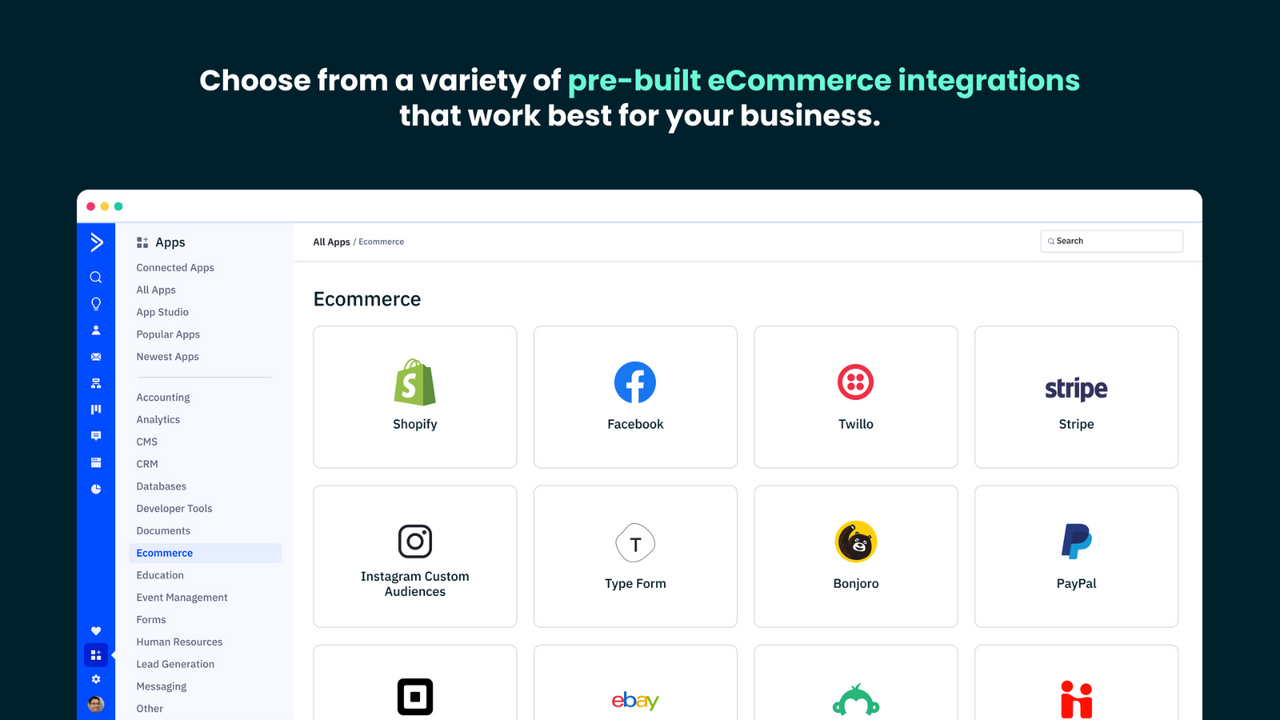
Shopify email offers seamless integration with a decent range of third-party integrations to expand functionality for Shopify stores and e-commerce businesses. There are integrations for accounting, shipping, merchant services, and other business systems.
For marketing, Shopify integrates with platforms like Facebook and Instagram for social ad management. It also connects with marketing automation tools like Klaviyo.
However, some key integrations are missing, like webinar software or survey tools. Shopify’s app store does not offer as many options compared to Zapier. Mainly geared for commerce, Shopify lags in marketing integrations compared to platforms like Mailchimp and Constant Contact.
Mailchimp
Mailchimp powers thousands of apps that are seamlessly integrated through Zapier native integration and the platform’s own API. Marketing and CRM tools like Facebook Ads, Stripe, Calendly, and Salesforce integrate easily.
Workflow automation can also incorporate forms, social posts, webinar signups, and more. With 300+ pre-built Zaps, Mailchimp offers one of the most extensive integration libraries to enhance functionality.
Winner: Mailchimp
So, Shopify Email Marketing vs Mailchimp: Which has better integrations for email marketing? While Shopify covers the basic commerce program integrations, Mailchimp’s enormous integration collection through Zapier surpasses it. Mailchimp’s both broad and deep set of connected ecommerce apps, combined with the ability to build workflows between tools, make it the winner for integrations.
7. Pricing
Shopify
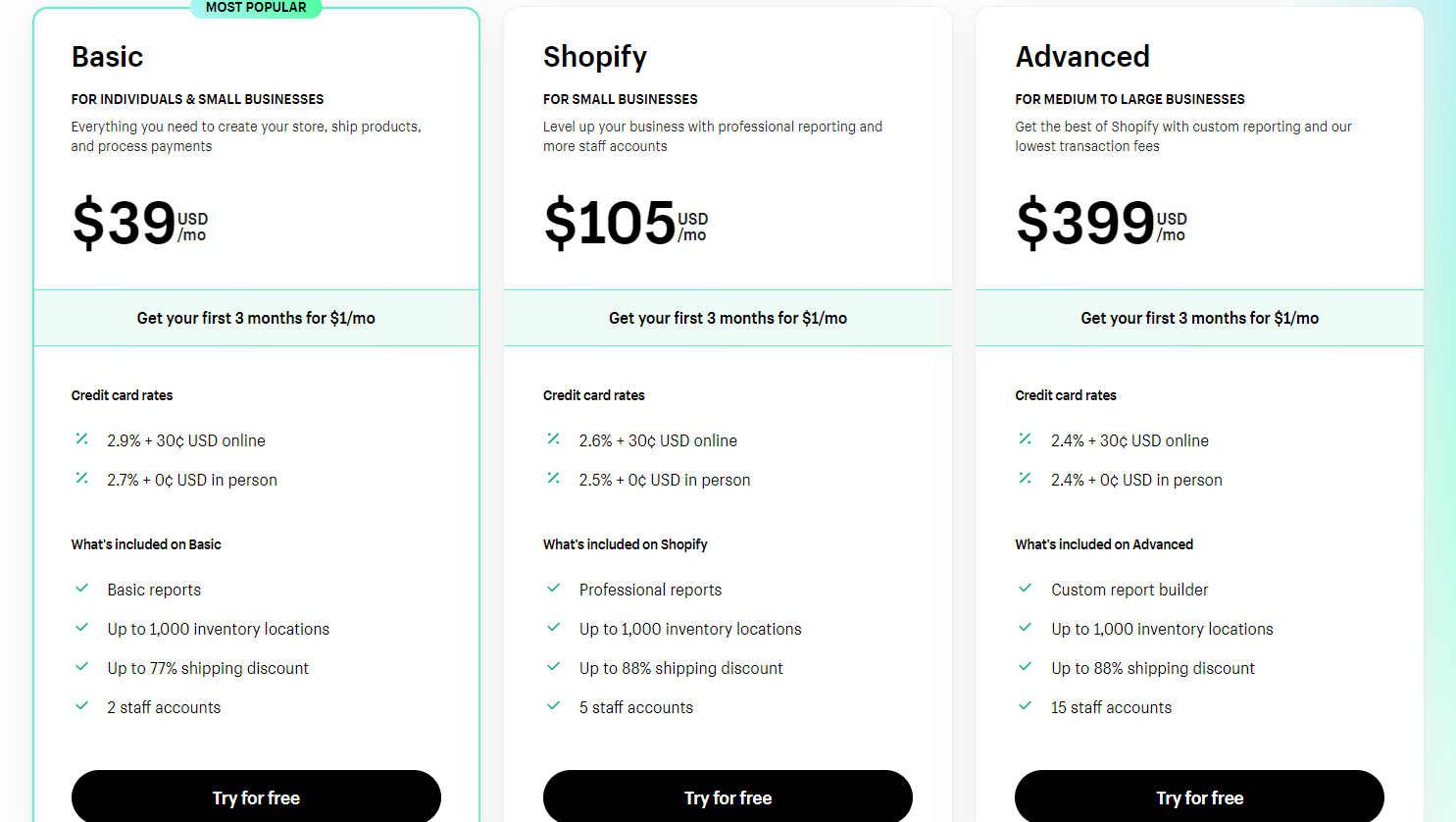
Shopify offers a free 14-day trial for any businesses seeking a complete e-commerce solution. Paid plans start at $39/month for the basic Shopify plan. This includes core features like unlimited products, 24/7 support, and a discount code for lower payment processing rates that you’ll appreciate as a Shopify store owner.
The $105/month Shopify plan adds gift cards, professional reports, and abandoned cart recovery. For advanced needs, Shopify charges 0.5-2% transaction fees.
Overall, Shopify email is affordably priced for small businesses. Features scale reasonably based on plan tiers. However, the 2% transaction fees at higher tiers can get costly compared to flat monthly pricing.
Mailchimp
Mailchimp has a free plan and 3 paid tiers: Essentials at $13/month, Standard at $20/month, and Premium at $350/month billed annually.
It’s pricing structure is simple and each paid plan in the lower tiers is suitable for small businesses. The Premium plan adds powerful enterprise features like journey builder, workflow automation, and advanced analytics.
Mailchimp’s free plan lets you send 1,000 emails per month with basic automation for your email marketing campaigns. Overall, Mailchimp offers cost-effective plans ideal for budget-conscious users.
Winner: Mailchimp
Both platforms are reasonably priced at lower tiers, making them ideal for email marketing on a budget. However, Mailchimp’s lack of variable transaction fees makes costs more predictable. Their pricing tiers by number of contacts also simplify cost planning as your business grows. Mailchimp provides more pricing transparency.
8. Reviews and Reputation
Shopify
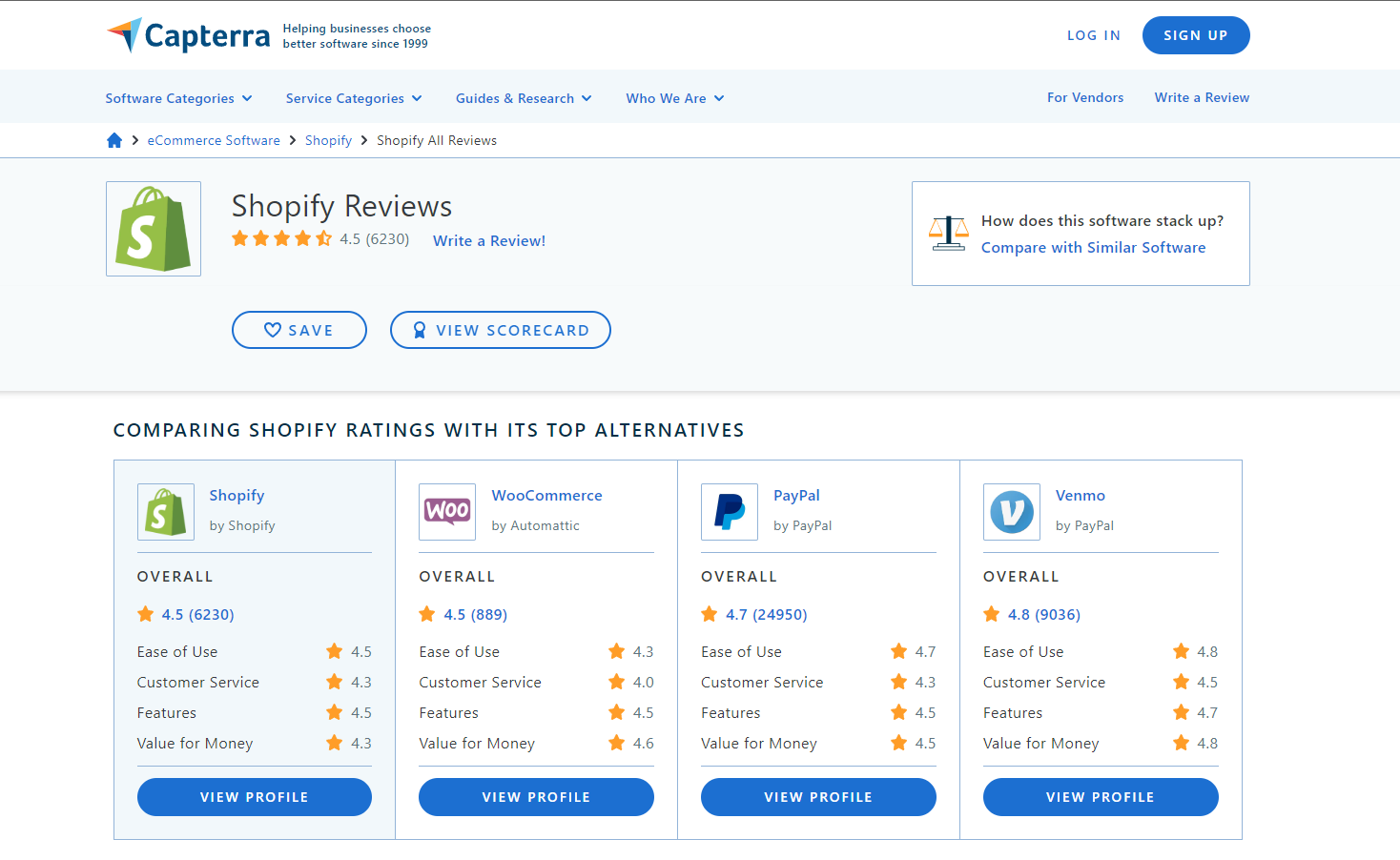
Email marketing continues to grow in popularity, and Shopify’s email marketing product earns positive reviews on sites like Capterra for its ease of use, designer templates, and robust e-commerce features for email subscribers, such as personalized product recommendations.
Users praise the intuitive Shopify email editor and integrated payment processing. Shopify’s themes and scalable pricing also appeal to small business owners.
However, some users find the transaction fees expensive at higher tiers. There are also complaints about limited native marketing features beyond basic email.
Mailchimp
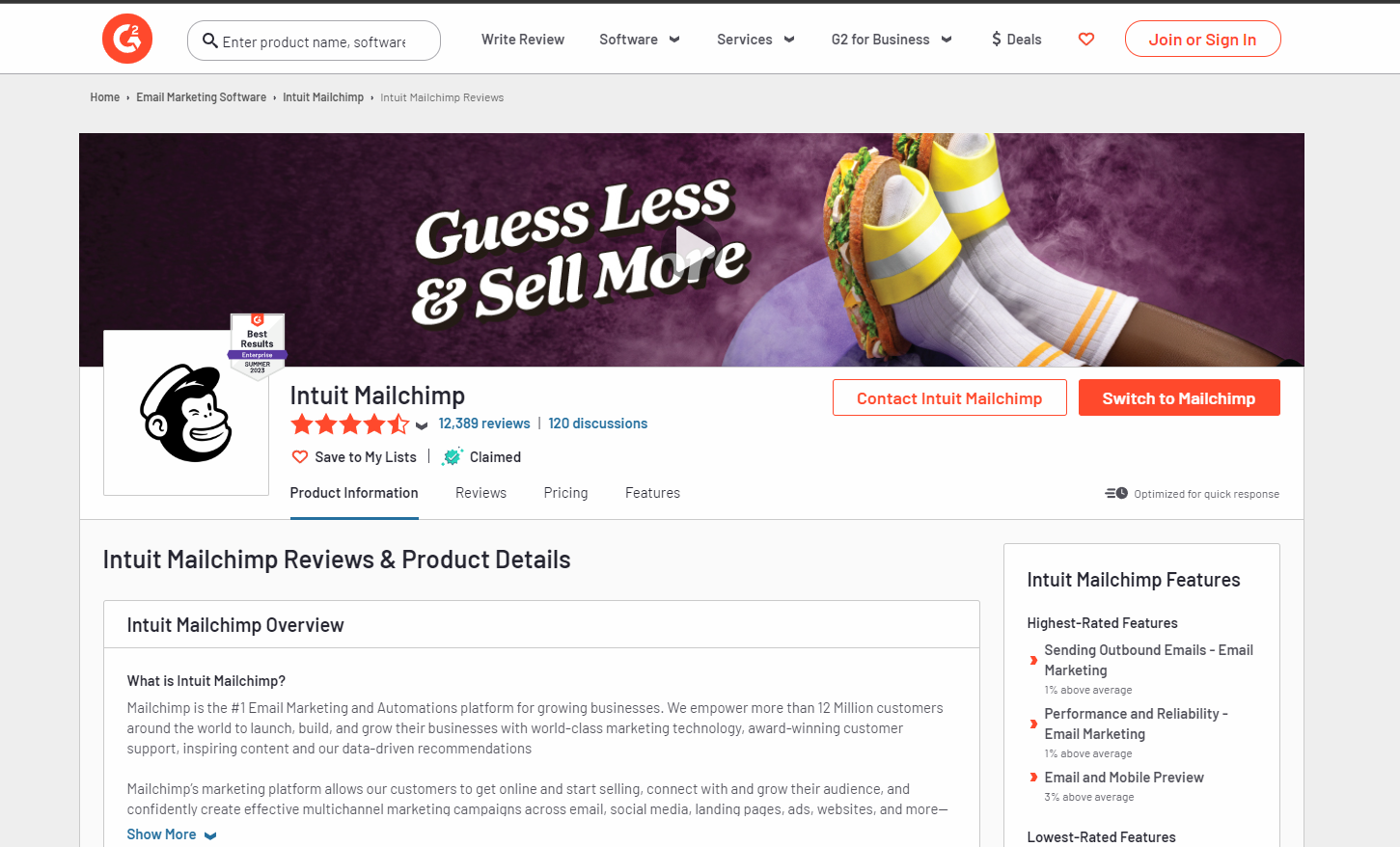
Mailchimp is beloved for its simplicity, automation tools, and excellent customer support. Users highlight the user-friendly drag-and-drop interface and extensive template selection. Mailchimp’s free tier and fair pricing are also big positives, especially for the welcome series templates and tools for automated campaigns.
Some users do take issue with occasional glitches or deliverability problems when running email marketing campaigns. However, most reviews on G2 and other sites give Mailchimp 4.3/5 stars.
Winner: Mailchimp
Both email marketing platforms have stellar reputations, but Mailchimp edges out Shopify as it has more features. While Shopify wins on e-commerce, some users want more sophisticated email and marketing tools at higher price tiers. Comparatively, reviews for Mailchimp show greater overall satisfaction thanks to usability, features, and transparent pricing.
9. FAQ’s
Shopify FAQs
- What are the fees for Shopify?
Shopify offers a 14-day free trial. Plans start at $39/month. Higher tiers have added transaction fees of 0.5-2% of sales. - Does Shopify offer email marketing features?
Yes, Shopify provides basic email marketing tools like customizable email templates, automation, and list management. More advanced features require third-party integrations. - How easy is Shopify to use?
The drag-and-drop editor and template-driven approach make Shopify very beginner-friendly. However, advanced customization requires web development skills.
Mailchimp FAQs
- Is Mailchimp really free to start?
Yes, Mailchimp has a forever free plan for up to 2,000 contacts and basic features. Paid plans start at $13/month. - What marketing features does Mailchimp offer?
In addition to email campaigns, Mailchimp offers landing pages, forms, surveys, social ads, and CRM tools to help manage contacts and campaigns. - How quickly does Mailchimp resolve support tickets?
Mailchimp pledges first response to support tickets within 30 minutes or less, 24/7. Phone and live chat are also available.
Final Thoughts
Choose Shopify if…
You primarily want an all-in-one e-commerce platform with powerful email marketing tools. Shopify streamlines setting up an online store with built-in tools for payments, shipping, and inventory management. The tight email/store integration creates a unified customer experience. Shopify is ideal for direct-to-consumer merchants focused on sales.
Choose Mailchimp if…
You want a dedicated email marketing platform with expansive features. Mailchimp excels in segmenting contacts, designing campaigns, automating workflows, and tracking performance. Its breadth of email and marketing tools makes it suitable for various business models, not just e-commerce.
You may also be interested in checking out some Mailchimp alternatives to help with the evaluation process.
